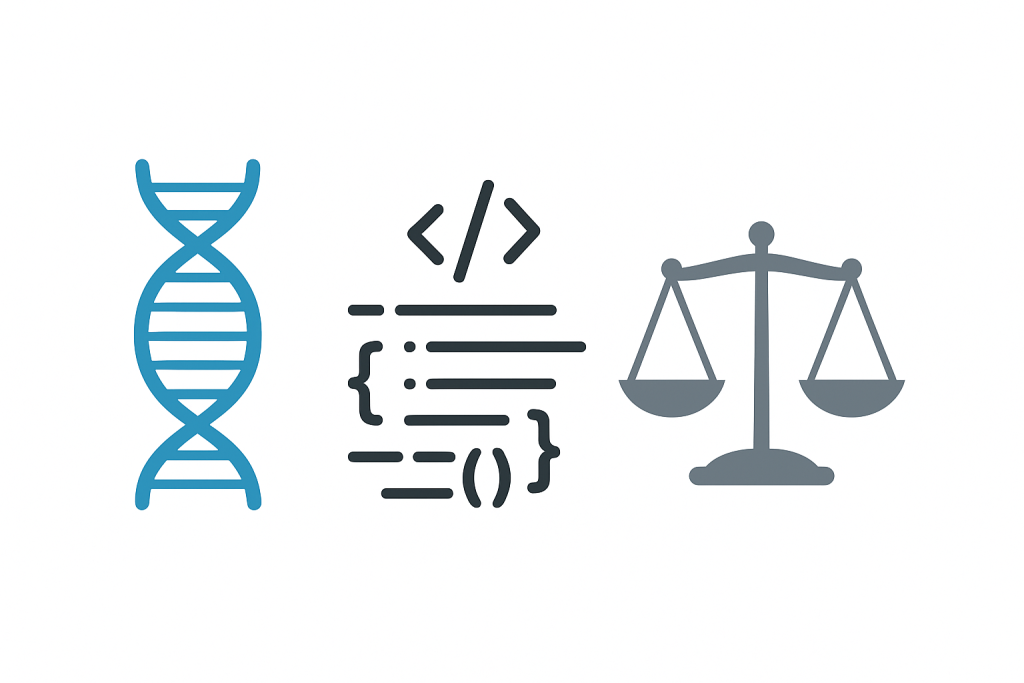When students learn to program life, they must also learn to protect it.
Why Ethics Belongs at the Center of Future STEM Education
As biology and technology merge, the role of the engineer is changing.
In the past, ethics in science education meant avoiding plagiarism, protecting lab safety, or following research protocols. But now, with the rise of synthetic biology, AI-driven genetic design, and digital bio-simulation, students can create systems that don’t just model life — they can influence it.
When code begins to write cells, ethics moves from the margins to the core of STEM.
Tomorrow’s innovators will need to be fluent not only in data and DNA, but in responsibility and transparency.
From Code Literacy to Moral Literacy
Teaching technical skills without ethical context is no longer enough.
Students are entering a world where a few lines of code can alter genetic behavior, design new organisms, or simulate ecosystems. They must understand both what is possible and what is permissible.
Ethical engineering education asks students to think beyond function — to ask:
- Who could be affected by this technology?
- How transparent should biological code be?
- What safeguards should protect digital experiments that model real organisms?
This approach turns coding from a purely logical exercise into a moral practice — one that blends reasoning, empathy, and foresight.
The Rise of “Living Code”
Living code is the convergence of biological and computational logic.
In modern classrooms and labs, algorithms can simulate genetic systems, design proteins, and model cell behavior in silico (digitally). Tools like Benchling, iBioSim, and Cello allow students to code biological behaviors much like writing software.
But unlike traditional programming, biological code interacts with life itself.
This means errors, misuse, or oversimplified assumptions could have real-world consequences, even if the work begins in a simulation.
Teaching students to approach this frontier with humility and care is essential.
They must see biological programming not as control over nature, but as collaboration with living systems.
Building Ethical Reflexes Early
Ethics isn’t a lecture — it’s a habit of thought.
To prepare responsible engineers and scientists, ethics must be embedded within technical education, not added on at the end.
Effective strategies include:
- Scenario-based learning: analyzing fictional but realistic cases of bio-tech misuse or oversight.
- Collaborative design reviews: where peers critique projects for safety and societal impact.
- Transparent documentation: teaching students to record not only results, but intentions and uncertainties.
- Cross-disciplinary reflection: inviting philosophy and civics into science classrooms to build perspective.
By practicing these habits, students learn that innovation and integrity are inseparable.
The Educator’s Role: Teaching Stewardship, Not Just Skills
Instructors are no longer just teachers of technology — they are mentors of judgment.
The ethical engineer isn’t defined by what they can build, but by what they choose not to build. Educators can model this mindset by emphasizing principles such as:
- Transparency: sharing methods and limitations openly.
- Accountability: recognizing that every algorithm or genetic model affects real systems.
- Sustainability: designing with ecological balance in mind.
- Equity: ensuring that bio-technical benefits are not limited to the few.
In classrooms that teach living code, moral imagination is as vital as technical precision.
Preparing for a World of Living Systems
As we move from hardware to lifeware, the next generation must be both creators and caretakers.
Students who can design biological simulations, engineer synthetic organisms, or use AI to model evolution will inherit extraordinary power — and responsibility.
Teaching them to think ethically doesn’t slow innovation; it safeguards it.
A world built on living code needs people who understand that progress without principles isn’t advancement — it’s risk.
The Takeaway
The future engineer will write in both programming languages and the language of life.
Teaching ethics in this context ensures that as our students build the next generation of technologies, they also build trust, safety, and accountability into the systems that shape our world.
Ethical engineering in biology and coding isn’t just a lesson — it’s the foundation for everything that follows.


